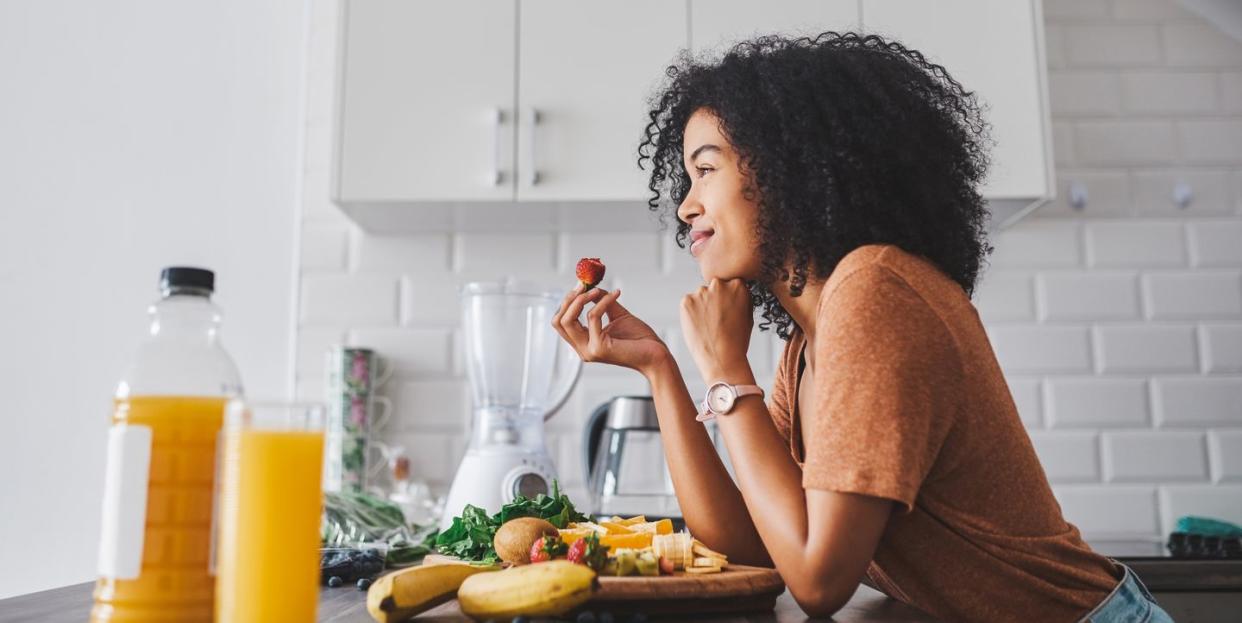Dietitians Explain the Key Differences Between a Plant-Based and Vegan Diet

Ask just about anyone what the difference between plant-based and vegan food is, and you'll get the same answer: "They're the same thing, right?" Contrary to what grocery store packaging and social media might insinuate, there's actually quite a big difference between these dietary lifestyles—and you'll probably find that you prefer one over the other, depending on your goals and values.
So what, exactly, makes a plant-based diet different from a vegan diet? To get it straight, we spoke to dietitians below. (Spoiler: You'll eat a lot of veggies either way.)
What's the definition of a vegan diet?
"A vegan lifestyle comprises of excluding all animal products, such as eggs, dairy, meat, and even honey," says Jerlyn Jones, R.D.N., L.D., owner of the Lifestyle Dietitian. "They eat fruits, vegetables, beans legumes, nuts, and seeds instead to comprise most of their meal plans." In essence: No products derived from animals are permitted.
Vegans also cannot wear any clothing or use any products made from or with animals, including wool and silk. And although a vegan diet is automatically plant-based, that term's meaning has evolved into something new.
What's the definition of a plant-based diet?
"There’s really not any one definition of what 'plant-based' is," says Diana Sugiuchi, RDN, LDN, founder of Nourish Family Nutrition. “For some people, that means no meat; for some, that means a little bit of meat; and for some, that means adding in more plants." Essentially, going plant-based means placing plants at the center of every meal.
"The two lifestyles are very similar, but the key difference is that you're not necessarily eliminating all animal products in a plant-based diet,” Jones adds. “The emphasis is mostly on the vegetables and fruits, but you may also include things like chicken or seafood every once in a while.”
The key difference is that you're not necessarily eliminating all animal products in a plant-based diet.
Which diet is better for weight loss?
“Everyone can benefit from eating more plant-based foods,” Jones says. “It's not limited to only those who want to prevent or treat certain diseases. Everyone can get on board with eating more fruits and vegetables, because that's what's recommended.” To make the most of either diet, ideally half or more of every meal should be comprised of plants.
It's possible to lose weight and improve your overall health with both vegan and plant-based lifestyles, and, based on your personal goals, either might have incredible health benefits. Neither is automatically healthier—that's up to you to decide. Eating plants is strongly linked to better health, including weight loss, lower risk of cancers, and reduced chances of type 2 diabetes.
“There is no one, set diet that is going to work for everybody, with their lifestyle and with their taste,” says Sugiuchi, who recommends that everyone meet with a professional before starting a vegan or plant-based lifestyle. “To find the best diet for anyone, it’s really thinking about your tastes, changes you’ll really be able to include on the regular.”
What else should I know?
It can be tempting to make the switch immediately, but both dietitians warn against jumping into any major decisions. “Any time you want to change the way you're eating, you have to really sit down and plan for it, and that's where a registered dietitian nutritionist can be a beneficial resource,” Jones says.
“Adding plants is a great way to start,” Sugiuchi says. “Substituting one meal per week, if you’re eating a lot of meat, with a meatless day, like the concept of Meatless Mondays, can be a great way to introduce these meals that feature less animal proteins.”
You also might not even have to worry about adhering to any one lifestyle. “People want to put labels on the way they’re eating: vegan, vegetarian, pescatarian,” Sugiuchi says. “I’m much more a fan of being flexible, especially if you’re transitioning into a different way of eating.”
Like what you just read? You’ll love our magazine! Go here to subscribe. Don’t miss a thing by downloading Apple News here and following Prevention. Oh, and we’re on Instagram too.
You Might Also Like

